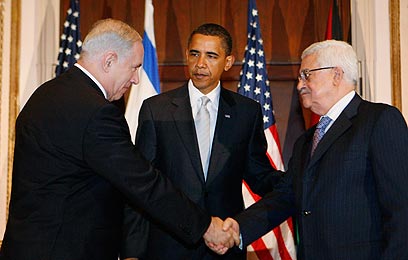
The Palestinians cannot return to peace talks at this time because of "fundamental disagreements" with Israel on what should be on the agenda, Palestinian President Mahmoud Abbas said in an interview published Thursday.
Abbas rebuffed an appeal by President Barack Obama that both sides get back to the table promptly.
The Palestinian leader said he wants to avoid a crisis with the Obama administration at any cost, but stressed that "there is no common ground for discussion" with Israel's hard-line leader, Benjamin Netanyahu.
Netanyahu has said two key issues – a partition of Jerusalem and a repatriation of Palestinian refugees – are not up for discussion. The Israeli prime minister retreated from assurances given by his predecessor, Ehud Olmert, who held talks with Abbas last year.
The Palestinian leader has insisted that negotiations pick up where they left off with Olmert, adding that progress was made during those talks on drawing a border between Israel and a future Palestinian state.
Abbas, who is in New York for the UN General Assembly, said that even at the risk of alienating Obama, he cannot return to talks without a clear agenda.
"In all honesty, we want to protect our relations with President Obama under any conditions," he told the London-based al-Hayat newspaper. "We don't want to come out with a crisis with the Americans, or create a crisis. But in the meantime, we can't go on unless there is a clear path. The road must be defined so we can know where we are going."
A difficult position
Earlier this week, an increasingly impatient Obama summoned Netanyahu and a reluctant Abbas to a trilateral meeting on the sidelines of the General Assembly. Obama told the two leaders that too much time had already been wasted and that it's time to resume negotiations.Netanyahu on Thursday welcomed Obama's appeal. "I'm pleased that President Obama accepted my request that there should be no preconditions," Netanyahu told Israel Radio in a telephone interview.
Obama's demand has put Abbas in a difficult position.
He has been adamant about not resuming talks unless Israel freezes settlement construction in the West Bank and east Jerusalem, areas the Palestinians claim for their state. A freeze is mandated by a US-backed peace plan, and the Obama administration was initially strident in calling for a halt to construction.
However, Netanyahu has refused to budge, offering at best to slow construction for a few months, and the US appears to have relented. In his speech to the UN General Assembly on Wednesday, Obama said that the US "does not accept the legitimacy of continued Israeli settlements," but stopped short of calling for a freeze.

Summit in New York this week (Photo: AFP)
If Abbas returns to talks now, without a freeze in place, he is likely to lose more credibility at home where he has been locked in a power struggle with his Islamic militant Hamas rivals. Hamas, which threw Abbas' forces out of the Gaza Strip two years ago, has derided negotiations as a waste of time and portrayed Abbas as a Western lackey.
Abbas said in the interview that only a complete freeze will do.
"We can't accept the status quo because a partial halt means a continuation of settlements," he said. "Even if it is halted by 95 percent, it is still a continuation of settlement activities."
Abbas said that despite "fundamental disagreements" with Netanyahu over the terms of negotiations, he will keep talking to Israel about day-to-day issues that concern the Palestinians, including security and the economy. "We don't reject the principle of talks and dialogue," he said.
Meanwhile, a senior Israeli official said Thursday that the New York summit presented an opportunity that "must not be missed." According to Israeli officials, the advancement of the peace process hinges on the coalition's ability to carry out measures that would require "painful concessions."
According to them, Israel must work towards advancing the negotiations in light of Abbas' growing popularity among the Palestinian public.
"We cannot miss the opportunity that has been created with the strengthening of Abbas' position and Obama's determination to promote the process, particularly in light of the fact that the Israeli government has clearly defined its goals," one official told Ynet.
Also on Thursday, Defense Minister Ehud Barak met with US special Mideast envoy George Mitchell to try and bridge the gap between Israel and the Palestinians while their delegations are still in New York, and in accordance with Obama's demand to see progress by mid-October.















